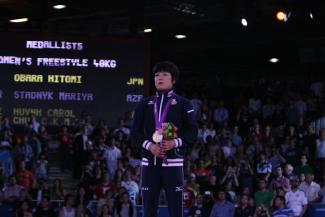WATCH: Tumur-Ochir's underhook supremacy
Tuesday, February 14, 2023 - 09:51 By Vinay Siwach

ZAGREB, Croatia (February 13) -- When Tulga TUMUR-OCHIR (MGL) walked back to the center after winning the bout against Evan HENDERSON (USA), he made it look rather casual.
The World Championships bronze medalist had performed a classy underhook throw for four points and won the quarterfinal 12-1 at the Zagreb Open Ranking Series last week. The bout had a lot of setups and transitions but one that stood out, perhaps in the whole tournament, was that underhook.
Hassan YAZDANI (IRI) and Rahman AMOUZAD (IRI) are at the top among underhooks. It's typical Iran style to attack and defend using the same setup. But Tumur-Ochir's underhook is very underrated.
An epic throw still fresh in the memory was against Bajrang PUNIA (IND) in the bronze medal bout at the 2019 World Championships which Punia survived after a long bridge position.
In Zagreb, Tumur-Ochir was more relaxed and after leading 8-1 at the break, he got into a dominant position. He put the underhook in place and snapped Henderson. Realizing that Henderson was ready for it, Tumur-Ochir quickly moved to grab for the inside leg and score a pushout. It was a little too far to control and Henderson defended with force.
Henderson pounced on an off-balance Tumur-Ochir and tried to get his arms around the Mongolian's back and almost got it. However, the underhook was still intact.
As Henderson tried to push his opponent to the mat, Tumur-Ochir flung a massive throw using the set underhook and power from his hips. The toss was worth four and victory.
And if the follow-through is a thing in wrestling, Tumur-Ochir perfected that as well. The grip was strong and the ties controlled. Tumur-Ochir made sure that Henderson lands on his back and not land on his arms which would have resulted in only two points for Tumur-Ochir.
Henderson was disappointed in losing that position as he slammed the mat after the bout. But there is little one can do when Tumur-Ochir gets going with those near-perfect underhooks.
Perhaps that was the reason Ismail MUSUKAEV (HUN) franticly moved away from Tumur-Ochir in the semifinals. But as Musukaev's conditioning worsened, TUmur-Ochir got his hands in the perfect place, scoring via stepouts and a takedown to win 6-1.
Then Joseph MCKENNA (USA) faced the wrath in the final. The first takedown scored by Tumur-Ochir in the second minute was a fake. He got an underhook on McKenna and as the latter defended it, Tumur-Ochir bent and hit a double-leg. In the second period, he once again put McKenna on the spot and hit the single leg using a similar setup.
With Tumur-Ochir becoming a big threat in 65kg, it would be a big test for veterans who have dominated this weight class so far.
But one bout that will test Tumur-Ochir will be against world champion Amouzad who is exceptional with his underhook, a move which made him the Asian and the world champion last year.
With the Asian Championships around the corner, this bout is more than a mere possibility.


Share your thoughts.
Comments